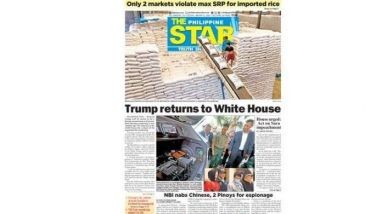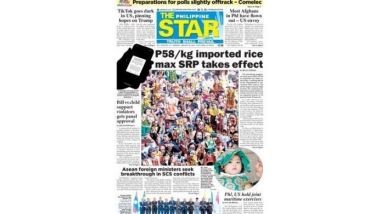Dellosa rejoinder to Bondoc’s March 24 and 26 columns
This refers to the opinion columns of Mr. Jarius Bondoc entitled “Customs game: seize-then-free contraband†and “Customs freeing contraband despite obvious smuggling†(Gotcha, 24 and 26 March 2014, respectively). In his 24 March 2014 column, he wrote that – “Hundreds of intelligence alerts were issued, but only a handful resulted in seizures of contraband. The few seizures were overturned, and the goods released – so loss of revenue.â€
May I convey that Mr. Bondoc is free to express his opinion based on his trusted sources that he calls “grumbling reformers.†My office, however, is near enough to the Philippine STAR’s office, and I will welcome any visit from him to take the time and effort to ascertain his facts.
Since my appointment to the Bureau of Customs in October 2013, the intensified alerts based on derogatory information have resulted in seized shipments with an estimated cumulative value of more than P250M. Total additional duties and taxes earned by the government as a result of thorough examination of alerted shipments amounted to P24.5M as of 21 March 2014.
Mr. Bondoc could have simply visited the website of the Bureau (http://customs.gov.ph/wp-contentluploads/2014102/Customs-Reform 022514- 01 .png) to find out for himself that reckoned from October 2013, the examinations on alerted shipments that were potentially undervalued or misclassified registered a 90% accuracy rate for adverse or derogatory findings, leading to higher collections for government.
As to the specific alerted cases that were furnished to him by his trusted sources, Mr. Bondoc perhaps mistakes an alert order as a seizure order, hence his title ‘seize-then-free-contraband,’ and his liberal use of ‘reversed’ and ‘overturned’ when referring to the lifting of alerts. An Alert Order is a simply a power vested upon a Customs official to subject a shipment to more thorough examination based on derogatory information. It is not an order to seize a shipment as that power is vested on the District Collector upon the recommendation of a competent authority for the issuance of a Warrant of Seizure and Detention.
Mr. Bondoc is correct when he wrote that as Deputy for Intelligence, my mission is to detect smugglers and colluding Customs insiders. I disagree with him, however, that an alert on the basis of undervaluation is usurpation of my authority.
Since my appointment, not a few viewed the alerts on undervalued declarations as an encroachment on the domain of assessment. I maintain, however, that while valuation issues fall within the purview of assessment, possible values distortions and undervaluation are Intelligence concerns as the previous practice of ‘benchmarking’ is illegal, and defrauds the government of lawful revenue. This Customs-tolerated practice is a form of technical smuggling, and creates loose processes and tolerant conditions that increase trade border risk, and the entry of anti-social goods. This and other observed irregularities in valuation could not solely be attributed to the brokers and importers/consignees, as the spread and brazenness with which they were encountered in the past could only have happened with the tacit blessings of Customs officials and agents.
Undervaluation cases are also indicators of graft and corruption as these instances create the windows of opportunity for ‘tara’ - the entrenched illicit arrangement among Customs personnel and their benefactors of sharing bribe money that your columnist has curiously not mentioned even once in his hardhitting two columns that supposedly aim to push for reforms in the Bureau.
I have not even begun to address his misinformed report against the efforts of my office against rice smuggling, but I know that your paper will not give me equal space to publish my reply. May I just end this letter, therefore, with an invitation for your columnist to visit our office so that we may provide data and information to hopefully enable him to develop a balanced report.
I take this opportunity to thank the Philippine STAR for its responsible coverage of the reforms being undertaken by our Commissioner. The challenge of reform in the Bureau of Customs needs the support of many stakeholders, and media truly plays a key role in accurately informing the public of the successes and shortfalls in this collective effort.
Thank you and more power to you. – Gen. Jessie D. Dellosa (Ret.), Deputy Commissioner, Bureau of Customs
- Latest



















